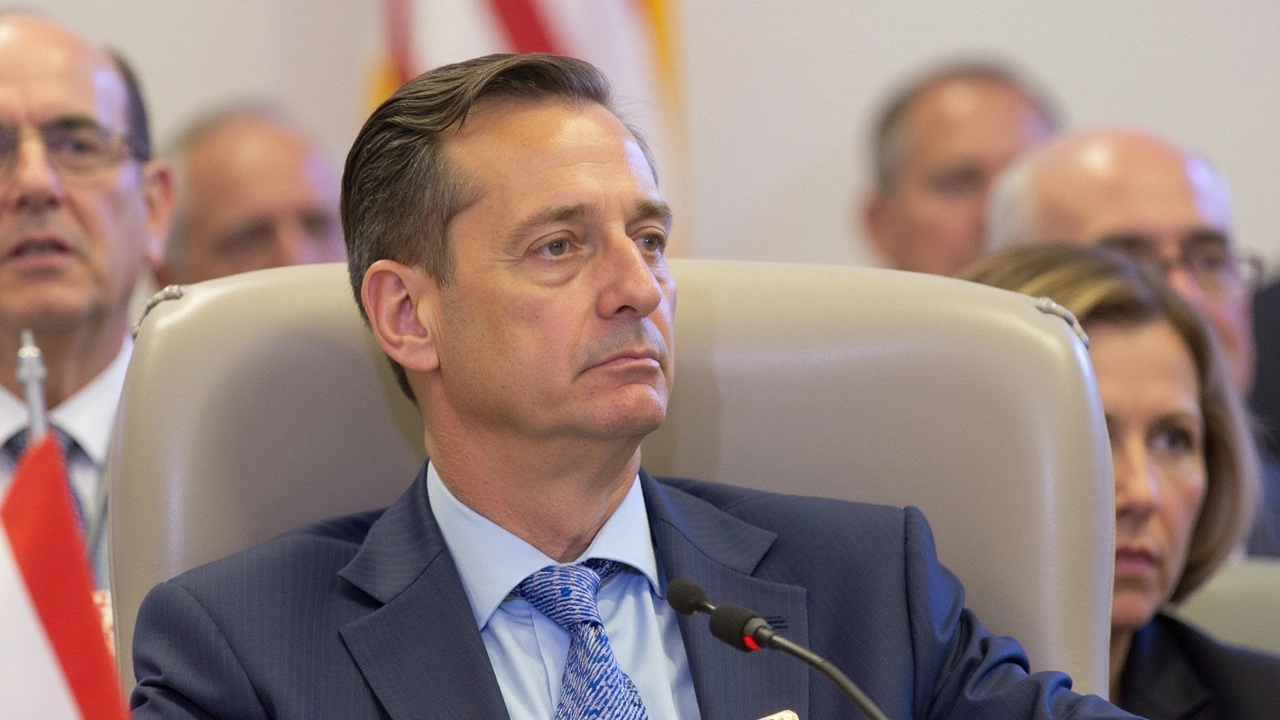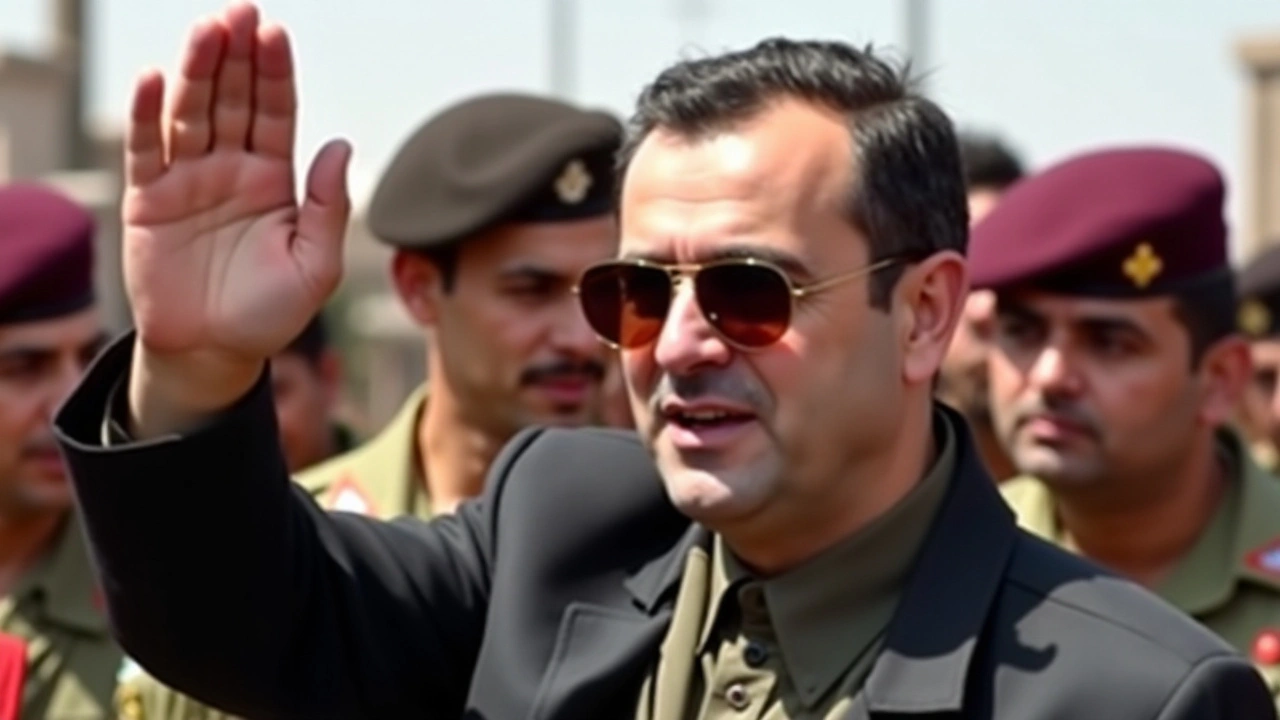The Unexpected Rise of Bashar al-Assad
Bashar al-Assad was born into a political dynasty in Damascus, Syria, on September 11, 1965. His father, Hafez al-Assad, was a formidable and long-standing ruler of Syria, known for a hardline approach and a tight grip on power. Bashar's early years did not suggest an inevitable path to the presidency; instead, it was his older brother Bassel who was the assumed heir to their father's rule. Bashar pursued a career in medicine, specializing in ophthalmology, and was living a seemingly unremarkable life in London when fate altered his trajectory. In 1994, tragedy struck with Bassel's sudden death in a car accident, abruptly thrusting Bashar into the limelight. With his family’s succession plans thrown into disarray, Bashar returned to Syria, abandoning his medical career to prepare for leadership. Under his father's guidance, Bashar plunged into political and military studies, a preparation phase that would set the foundation for his eventual ascendancy to power in 2000 after his father's death.
Promises and Perils of a New Leadership
When Bashar al-Assad assumed the presidency in 2000, there was an air of cautious optimism both within Syria and internationally. Initially, he was perceived as a potential reformer willing to steer the country towards modernization and greater openness. This period, often referred to as the 'Damascus Spring,' saw some loosening of the oppressive controls that had characterized his father’s regime. Assad permitted the emergence of political discussion forums, eased restrictions on freedom of expression and the press, and released several hundred political prisoners. Yet, this window of liberalization was short-lived. The old guard, wary of any potential erosion of their power, exerted pressure on Assad to halt the reforms. Before long, the regime reverted to familiar tactics of threats and arrests, effectively extinguishing the early signs of pro-reform activism.

The Descent into Conflict and Repression
By the time 2011 rolled around, Syria was a nation simmering with discontent. Inspired by the waves of protest sweeping the Arab world, Syrians took to the streets in droves, demanding greater freedoms and reforms. The peaceful demonstrations represented a critical stretch for Assad's leadership—a chance to choose reform or repression. Assad's decision to meet these calls for change with violence set a tragic course for the country. The government’s fierce crackdown on protestors, rationalized under the guise of combatting terrorism, escalated tensions and plunged Syria into a brutal civil war. The conflict drew global attention and became one of the century’s bloodiest confrontations. Estimates suggest over 500,000 people have died, while millions of others have been forced to flee, leading to one of the biggest refugee crises in recent history.
Alliance and Endurance
Despite the internal chaos and international condemnation, Assad’s regime has endured, bolstered by strategic alliances with Russia, Iran, and Hezbollah in Lebanon. These partnerships have been pivotal in Assad maintaining a firm grip on power. The loyal support from Russia, in particular, has changed the dynamics of the war, allowing Assad to regain and consolidate control over key regions. His government’s narrative has continuously portrayed the regime as the protector of Syria’s diverse ethnic and religious communities, suggesting that only their leadership can ensure stability in an otherwise fragmented society.

Contesting the Legitimacy of Leadership
While Assad has managed to sustain power within Syria, the methods and legitimacy of his rule have come under growing scrutiny. Critics consistently highlight his authoritarian oversight of elections, which are widely considered to be neither free nor fair. Opposition parties often find themselves banned, and voter participation is typically enforced as a civic duty rather than being voluntary. Reports of voter intimidation and ballot manipulation are rife, painting a grim picture of democratic practices under Assad's regime. These undemocratic practices have only served to heighten tensions and strengthen the resolve of opposition factions.
A Nation at Crossroads
As of late, the complex tapestry of alliances and oppositions in Syria indicates a regime at a crucial juncture. Recent reports from the Syrian Observatory for Human Rights hinted that Assad left the country as of December 8, 2024, marking a significant pivot point in Syria’s political landscape. Rebels had reportedly entered Damascus, challenging the longevity of Assad's rule and signaling the potential end of his family's five-decade dynasty. The unfolding situation has left the world watching, as Syrians and international observers ponder what might fill the vacuum of power should Assad’s regime crumble.

The Future of Syria and Assad's Legacy
The question of Bashar al-Assad’s legacy is one that will loom large in the chronicles of Syrian history. Whether remembered as a reformer turned tyrant or a resilient leader navigating impossible odds, the divide between perception and reality is stark. For many Syrians and international stakeholders, focusing on rebuilding a war-ravaged nation takes precedence over past grievances. However, addressing the socio-political scars left by years of tumult under Assad’s regime remains crucial for Syria’s future prosperity and cohesion as a nation.


Josh Tate
I feel like the personal side of Bashar’s story gets lost in all the geopolitics. He was a doctor, sure, but that doesn’t automatically make him a benevolent ruler. The tragedy of losing his brother definitely changed his path, but it doesn’t excuse the later choices. The article kinda glosses over how ordinary Syrians felt during that shift. It’s a tough balance between empathy and reality, and the piece could’ve dug deeper.
John Smith
Everyone loves to romanticize his medical background as if it’s a badge of honor, when in fact it was just a convenient PR tool. The real story is far more sordid.
Alex Soete
Reading this reminds me how crucial it is to keep hope alive, even when the odds seem stacked. Bashar’s early promises sparked a spark of optimism that many needed. We should remember that even small reforms can plant seeds for bigger change. The resilience of Syrians in the face of repression is truly inspiring. Let’s keep talking about how civil society can rebuild from the ground up. Every voice counts in shaping a post‑conflict future.
Cara McKinzie
Oh wow, another "heroic" narrative about Assad, how original! It’s like watching a bad drama on repeat. The article tries so hard to sound serious, yet it’s just a lazy recap of the same old headlines. I’m bored already.
Joseph Conlon
It's amazing how history repeats itself, yet everyone seems blind to the patterns.
While the article paints a picture of inevitability, the reality is far messier.
The so‑called “Damascus Spring” was more of a fleeting breeze than a systemic gale.
Even the brief reforms were crippled by entrenched power structures that nobody wants to admit.
International actors love to point fingers, yet they also supply the weapons that fuel the conflict.
Russia's involvement is framed as strategic, but it's also a chess move in a bigger game.
Iran's support is sold as religious solidarity, ignoring its own territorial ambitions.
The narrative that Assad is the sole protector of minorities is a convenient myth.
Many communities suffered under his rule just as much as under the rebels.
The refugee crisis is not just a Syrian problem, it's a global failure of responsibility.
One cannot separate the personal tragedy of losing a brother from the political opportunism that followed.
The article glosses over the fact that many Syrians still cheer for change despite the risks.
Moreover, the idea that the regime is unassailable is being challenged daily on the ground.
In short, to understand Assad's rise you must look beyond simple victim‑victim narratives and see the chessboard of power.
Mohit Singh
Honestly, the piece tries to be neutral but ends up sounding like a passive‑aggressive rant. Assad’s alliances are mentioned, yet the author doesn’t call out the blatant exploitation of Syrian lives. The tone swings between detached facts and subtle condemnation, which can feel manipulative. A clearer stance would help readers parse the moral dimensions without guessing.
Damian Liszkiewicz
Let’s take a moment to reflect on the larger philosophical implications of power and legitimacy. History often shows us that the legitimacy of a ruler depends not just on elections but on the consent of the governed. In Syria’s case, the international community’s endorsement or condemnation plays a crucial role. 🌍 The humanitarian cost should be the central metric we use when evaluating any regime. 🤔✨
Angela Arribas
Honestly, the article’s grammar is riddled with clichés and vague statements. It’s disappointing to see such a lack of precision when discussing a subject of this gravity. 🙄
Sienna Ficken
Wow, another deep dive into Assad’s life-how refreshing. The narrative feels like a recycled memoir with a splash of drama, but where’s the fresh insight? The piece could have used a dash of sarcasm to cut through the gloom. Still, it does a decent job of laying out the timeline for those who need a quick refresher.
Zac Death
Great recap! I especially appreciate how the article balances the early optimism with the later harsh realities. It’s important to remember that while the regime survived, many Syrians kept fighting for any chance at freedom. The mention of global alliances highlights how interconnected the conflict really is. Even if the piece glosses over some details, it serves as a solid foundation for deeper discussion. Keep the conversation going-there’s still so much to unpack about the future of the region.
Lizzie Fournier
The timeline is helpful, but I wish there was more focus on the lived experiences of ordinary Syrians.
JAN SAE
Exactly, personal stories matter.
Steve Dunkerley
The article’s structure is clear, yet it could benefit from incorporating more technical analyses of the geopolitical dynamics, such as the energy security implications and the strategic calculus behind Russian involvement. Incorporating precise terminology enhances credibility and aids readers in grasping the complexity of the conflict.
Jasmine Hinds
Great point! Let’s keep the vibe positive! :)
Madison Neal
I appreciate the balanced overview and hope future discussions will center more on reconciliation and rebuilding efforts.